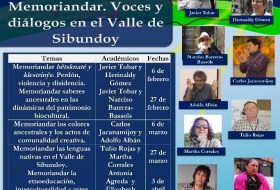News
Seedbed and research group of Unicauca visit the Sibundoy Valley (Putumayo)
Within the framework of the social interaction proposal virtual and pedagogical visits to the communities, the Biolugargogía and Ancestral Memories and Wisdoms Seedbed and the Research Group on Intercultural Rural Education of the Intercultural Studies Department, began their plan of activities in the Sibundoy Valley (Putumayo) that runs from February 1 to May 31 of this year.
Based on the principle of “Mutual Hand” between the Ayents̈e Collective of the kamënts̈á native people and the Biolugargogía Seedbed, two important virtual events were scheduled. The first of them is a pedagogical space, in development of the Círculo de Biolugargogía Workshop Seminar, which consists of a training process with members of the Kamënts̈á, Inga and peasant communities of the Sibundoy Valley, allowing them to think and act on the safeguarding of the ancestral memories and knowledge. On the other hand, the development of the proposal 'Memoriandar' voices and dialogues between experts, researchers and academics from the University of Cauca and other national and international institutions was proposed.
"This type of space is very important to walk the territories, allowing us to really think, value, resist, respect and empower the ancestral wisdoms that we have from our places, to be together and revitalize not only cultural, but also linguistic actions," he said, the majority Yanakuna Omaira Anacona Jiménez in her words of welcome last February 1 during the installation of the Workshop Seminar.
For his part, the dean of the Faculty of Human and Social Sciences, Dr. Tulio Rojas expressed that “one of the strengths of indigenous peoples and of us, the national society is that we are able to share without exclusions, without leaving out the others, with respect and above all learning from the knowledge and teachings that many colleagues have today but that have been bequeathed to us from time immemorial by people and wise men that we recognize as the great-taita Carlos Tamabioy, the eldest Juan Tama de la Estrella, the majority mama Manuela Caramaya and so many people who have left traces to continue learning, knowing and exchanging knowledge because there is a science of indigenous peoples that we must recognize ”.
Meanwhile, Professor Olga Sanabria, coordinator of the Doctorate in Ethnobiology and Biocultural Studies at Unicauca described this space as “a commitment to consolidate the different epistemes, knowledge, theoretical, methodological and conceptual processes that we are looking for, from the academy, from the University of Cauca and especially from the acts of educating, in the memories and ancestral wisdom in the Valley of Sibundoy ”. In addition, he stressed that “Biolugargogy is a seedbed that Professor Willian Mavisoy is wanting to walk and we are accompanying him, but also participating with dialogues of interdisciplinary knowledge, inter-scientific communication with a great sense of being able to gather, revalue, respect and revitalize all the indigenous wisdoms that should be in the different epistemes that are handled in education”.
It should be noted that as part of the virtual and pedagogical visit carried out on February 6 through the Waishanyá Station and on Facebook Live, the program Bëngbe Benachëng Memoriandar bëtsknaté y klestrinÿe - Forgiveness, violence and dissidence, was developed in the presence of the knowledgeable Kamënts̈á Emerenciana Chicunque and the researchers Javier Tobar and Herinaldy Gómez.
Dialogue of knowledge that highlighted the bëtsknaté and the klestrinÿe as an intimate ritual that offers humanity a different way of resolving personal, family, social conflicts and with Mother Earth through a festival, in relation to the natural cycles of life, which recalls in the form of its own practices acts of reconciliation based on millenary ethical principles that guide the coexistence of ancestral peoples.
This training process will take place on the first and last Monday of each month and the meetings between scholars and academics will be held on the first and last Saturday of each month with broadcast by the local station Waishanyá 97.3 Fm and on its Facebook live.
The Bëtsknaté or klestrinÿe is a festival that the Kamënts̈á people commemorate annually in family and community union with music, dance, offerings, their own dishes, crafts and other essential activities for spiritual and cognitive harmony, the historical memory of the place.
More information:
Research Group on Rural Intercultural Education
E-mail. edururalinter@unicauca.edu.co
Biolugargogy Seedbed. Ancestral memories and wisdoms.
E-mail. memoriandar@unicauca.edu.co


